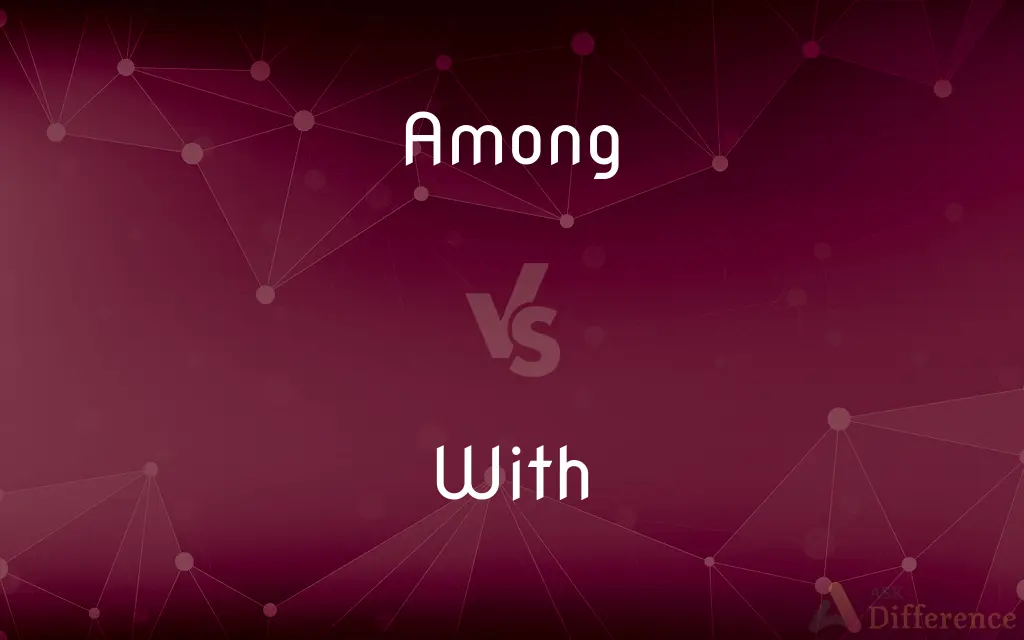Among vs. With — What's the Difference?
By Tayyaba Rehman & Urooj Arif — Updated on April 3, 2024
Among emphasizes being in the midst of or part of a group, while with focuses on accompaniment, association, or connection.

Difference Between Among and With
Table of Contents
ADVERTISEMENT
Key Differences
Among is used to indicate a relationship involving more than two entities or to express something being within or part of a group or a collective. With, on the other hand, signifies a relationship or association between two or more entities, often implying companionship, connection, or possession.
Among often conveys a sense of distribution or differentiation within a group. For example, "The prize was divided among the winners" suggests that the prize was distributed to multiple winners within a group. With can also denote the means or instrumentality by which an action is performed. When someone says, "She writes with a pen," it indicates that the pen is the tool used for writing.
While among is more about being part of a larger set or group without specifying individual relationships, with is more direct, emphasizing specific connections or associations between entities.
Comparison Chart
Usage Context
Used when referring to relationships within groups or collectives.
Used to describe relationships or associations between individuals or things, or means of action.
Connotation
Implies being part of a larger set without individual specificity.
Indicates a closer, more specific connection or association.
ADVERTISEMENT
Examples
"Among the crowd," "divided among the team."
"Walking with a friend," "cut with a knife."
Function
Denotes a diffuse relationship within a group.
Specifies association, companionship, or means.
Prepositions
Often followed by plural nouns or pronouns.
Can be followed by singular or plural nouns, denoting possession or accompaniment.
Compare with Definitions
Among
In the presence of.
He stood among the trees, feeling at peace.
With
Accompanied by another person or thing.
She arrived with her brother.
Among
Being in the company of.
He felt comfortable among friends.
With
By means of.
She cut the paper with scissors.
Among
Shared or divided.
The inheritance was split among the four siblings.
With
In opposition to.
He fought with his inner demons.
Among
Part of or included within.
Her name was famous among scholars.
With
Indicating a manner.
He spoke with enthusiasm.
Among
Being a member or part of a group.
She was among the first to arrive.
With
Having or possessing something.
A man with a vision.
Among
Situated more or less centrally in relation to (several other things)
You're among friends
Flowers hidden among the roots of the trees
With
Accompanied by (another person or thing)
A nice steak with a bottle of red wine
Among
Being a member or members of (a larger set)
Snakes are among the animals most feared by man
A British woman was among the 54 victims of the disaster
With
Having or possessing (something)
A flower-sprigged blouse with a white collar
Among
Occurring in or shared by (some members of a group or community)
Members of the government bickered among themselves
A drop in tooth decay among children
With
Indicating the instrument used to perform an action
Cut the fish with a knife
Treatment with acid before analysis
Among
Indicating a division, choice, or differentiation involving three or more participants
The State Council would elect a temporary president from among its members
The old king called the three princesses to divide his kingdom among them
With
In opposition to
A row broke out with another man
Among
In the midst of; surrounded by
A pine tree among cedars.
With
Indicating the manner or attitude in which a person does something
The people shouted with pleasure
Among
In the group, number, or class of
She is among the wealthy.
With
Indicating responsibility
Leave it with me
Among
In the company of; in association with
Traveling among a group of tourists.
With
In relation to
My father will be angry with me
Among
By many or the entire number of; with many
A custom popular among the Greeks.
With
Employed by
She's with the Inland Revenue now
Among
By the joint action of
Among us, we will finish the job.
With
In the same direction as
Marine mammals generally swim with the current
Among
With portions to each of
Distribute this among you.
With
Indicating separation or removal from something
To part with one's dearest possessions
Their jobs could be dispensed with
Among
With or against one another
Don't fight among yourselves. See Usage Note at between.
With
In the company of; accompanying
Did you go with her?.
Among
Denotes a mingling or intermixing with distinct or separable objects. (See Usage Note at amidst.)
How can you speak with authority about their customs when you have never lived among them?
With
Next to; alongside of
Stood with the rabbi.
Sat with the family.
Among
Denotes a belonging of a person or a thing to a group.
He is among the few who completely understand the subject.
With
Having as a possession, attribute, or characteristic
Arrived with bad news.
A man with a moustache.
Among
Denotes a sharing of a common feature in a group.
Lactose intolerance is common among people of Asian heritage.
With
Used as a function word to indicate accompanying detail or condition
Just sat there with his mouth open.
A patient with a bad back.
Among
Mixed or mingled; surrounded by.
They heard,And from his presence hid themselves amongThe thickest trees.
With
In a manner characterized by
Performed with skill.
Spoke with enthusiasm.
Among
Conjoined, or associated with, or making part of the number of; in the number or class of.
Blessed art thou among women.
With
In the performance, use, or operation of
Had trouble with the car.
Among
Expressing a relation of dispersion, distribution, etc.; also, a relation of reciprocal action.
What news among the merchants?
Human sacrifices were practiced among them.
Divide that gold amongst you.
Whether they quarreled among themselves, or with their neighbors.
With
In the charge or keeping of
Left the cat with the neighbors.
With
In the opinion or estimation of
If it's all right with you.
With
In support of; on the side of
I'm with anyone who wants to help the homeless.
With
Of the same opinion or belief as
He is with us on that issue.
With
In the same group or mixture as; among
Planted onions with the carrots.
With
In the membership or employment of
Plays with a jazz band.
Is with a publishing company.
With
By the means or agency of
Eat with a fork.
Made us laugh with his jokes.
With
By the presence or use of
A pillow stuffed with feathers.
Balloons filled with helium.
With
In spite of
With all her experience, she could not get a job.
With
In the same direction as
Sail with the wind.
Flow with the river.
With
At the same time as
Gets up with the birds.
With
In regard to
We are pleased with her decision. They are disgusted with the status quo.
With
Used as a function word to indicate a party to an action, communicative activity, or informal agreement or settlement
Played with the dog.
Had a talk with the class.
Lives with an aunt.
With
In comparison or contrast to
A car identical with the one her sister just bought.
With
Having received
With her permission, he left. I escaped with just a few bruises.
With
And; plus
My books, with my brother's, make a sizable library. We had turkey with all the trimmings.
With
Inclusive of; including
Comes to $29.95 with postage and handling.
With
In opposition to; against
Wrestling with an opponent.
With
As a result or consequence of
Trembling with fear.
Sick with the flu.
With
So as to be touching or joined to
Coupled the first car with the second.
Linked arms with their partners.
With
So as to be free of or separated from
Parted with her husband.
With
In the course of
We grow older with the hours.
With
In proportion to
Wines that improve with age.
With
In relationship to
At ease with my peers.
With
Being the partner of in a romantic relationship
In April, I will have been with my husband 24 years.
With
As well as; in favorable comparison to
She could sing with the best of them.
With
According to the experience or practice of
With me, it is a question of priorities.
With
Used as a function word to indicate close association
With the advent of the rockets, the Space Age began.
With
As company; along
We're going to the movies. Are you coming with?.
With
Against.
He picked a fight with the class bully.
With
In the company of; alongside, close to; near to.
He went with his friends.
With
In addition to; as an accessory to.
She owns a motorcycle with a sidecar.
With
Used to add supplemental information, especially to indicate simultaneous happening, or immediate succession or consequence.
Jim was listening to Bach with his eyes closed.
The match result was 10-5, with John scoring three goals.
With a heavy sigh, she looked around the empty room.
Four people were injured, with one of them in critical condition.
With their reputation on the line, they decided to fire their PR team.
With
In support of. redundant to be with#English?
We are with you all the way.
With
In regard to.
There are a number of problems with your plan.
What on Earth is wrong with my keyboard?
He was pleased with the outcome.
I'm upset with my father.
With
(obsolete) To denote the accomplishment of cause, means, instrument, etc; – sometimes equivalent to by.
Slain with robbers
With
Using as an instrument; by means of.
Cut with a knife
I water my plants with this watering can. This is the watering can I water my plants with.
Find what you want instantly with our search engine.
They dismissed the meeting with a wave of their hand.
Speak with a confident voice.
With
(obsolete) Using as nourishment; more recently replaced by on.
With
Having, owning.
It was small and bumpy, with a tinge of orange.
With
Affected by (a certain emotion or condition).
Speak with confidence.
He spoke with sadness in his voice.
The sailors were infected with malaria.
With
Prompted by (a certain emotion).
Overcome with happiness
Green with envy; flushed with success
With
In the employment of.
She's was with Acme for twenty years before retiring last fall.
With
Keeping up with; understanding; following along.
That was a lot to explain, are you still with me?
With
(US) Along, together with others, in a group, etc.
Do you want to come with?
With
Alternative form of withe
With
See Withe.
With
With denotes or expresses some situation or relation of nearness, proximity, association, connection, or the like.
With
To denote a close or direct relation of opposition or hostility; - equivalent to against.
Thy servant will . . . fight with this Philistine.
With
To denote association in respect of situation or environment; hence, among; in the company of.
I will buy with you, talk with you, walk with you, and so following; but I will not eat with you, drink with you, nor pray with you.
Pity your own, or pity our estate,Nor twist our fortunes with your sinking fate.
See where on earth the flowery glories lie;With her they flourished, and with her they die.
There is no living with thee nor without thee.
Such arguments had invincible force with those pagan philosophers.
With
To denote a connection of friendship, support, alliance, assistance, countenance, etc.; hence, on the side of.
Fear not, for I am with thee, and will bless thee.
With
To denote the accomplishment of cause, means, instrument, etc; - sometimes equivalent to by.
That with these fowls I be all to-rent.
Thou wilt be like a lover presently,And tire the hearer with a book of words.
[He] entertained a coffeehouse with the following narrative.
With receiving your friends within and amusing them without, you lead a good, pleasant, bustling life of it.
With
To denote association in thought, as for comparison or contrast.
Can blazing carbuncles with her compare.
With
To denote simultaneous happening, or immediate succession or consequence.
With that she told me . . . that she would hide no truth from me.
With her they flourished, and with her they die.
With this he pointed to his face.
With
To denote having as a possession or an appendage; as, the firmament with its stars; a bride with a large fortune.
Common Curiosities
Is "among" appropriate for two entities?
Typically, "among" is used for three or more entities, while "between" is used for two.
Can "among" and "with" be used interchangeably?
No, "among" is used for indicating a relationship within a group, while "with" denotes accompaniment or possession.
Can "with" indicate methods or means?
Yes, "with" can indicate the tools, methods, or means by which something is done.
Is "among" used only with people?
No, "among" can be used with objects and concepts as well, indicating a sense of being part of a group or set.
Is "among" suitable for indicating distribution?
Yes, "among" often implies distribution among members of a group.
Can "among" be used to imply exclusivity within a group?
Yes, it can imply a distinctive status or characteristic within a group.
What is the difference in the preposition usage between "among" and "with"?
"Among" is typically used with plural nouns to denote being part of a group, while "with" can be used with both singular and plural nouns, denoting accompaniment or means.
How do "among" and "with" contribute to clarity in writing?
They help specify the nature of relationships between entities, enhancing understanding.
How do "among" and "with" differ in terms of relationship depiction?
"Among" depicts a more general relationship within a group, while "with" indicates a direct, specific connection.
Does "with" always imply companionship?
Not always, "with" can also indicate possession, methods, or manner in addition to companionship.
Can "with" denote condition or manner?
Yes, "with" can describe conditions or manner, such as "with joy."
Can the use of "among" or "with" change the meaning of a sentence?
Yes, choosing one over the other can significantly alter the meaning or emphasis of a sentence.
Can "with" imply conflict or opposition?
Yes, "with" can be used to denote opposition, as in "arguing with a friend."
Does "with" always require direct contact or presence?
Not necessarily; "with" can denote association or possession without direct contact.
How does context affect the choice between "among" and "with"?
The choice depends on whether the emphasis is on being part of a group or on specific associations or methods.
Share Your Discovery

Previous Comparison
Knit vs. Purl
Next Comparison
India vs. AmericaAuthor Spotlight
Written by
Tayyaba RehmanTayyaba Rehman is a distinguished writer, currently serving as a primary contributor to askdifference.com. As a researcher in semantics and etymology, Tayyaba's passion for the complexity of languages and their distinctions has found a perfect home on the platform. Tayyaba delves into the intricacies of language, distinguishing between commonly confused words and phrases, thereby providing clarity for readers worldwide.
Co-written by
Urooj ArifUrooj is a skilled content writer at Ask Difference, known for her exceptional ability to simplify complex topics into engaging and informative content. With a passion for research and a flair for clear, concise writing, she consistently delivers articles that resonate with our diverse audience.














































